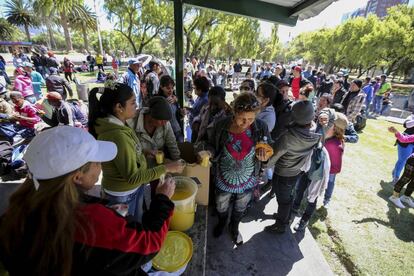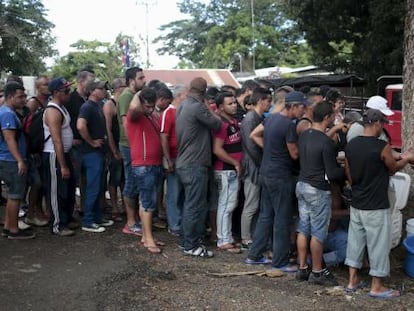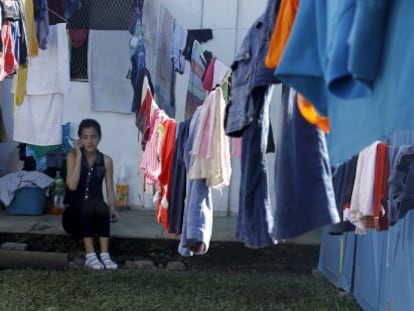“We are victims of human trafficking”
Hundreds of Cuban migrants are camping out in a park in downtown Quito as they wait to be allowed passage to the United States

Around 500 Cuban migrants have spent the last month camping out in Quito, as they wait for the governments of Ecuador and Mexico to allow them safe passage to the United States. At first, a few dozen people set up a demonstration near the Mexican embassy to ask for humanitarian visas that would allow them to enter Mexico on their way to the United States, where they expect to receive asylum like the 8,000 Cuban migrants who were stranded in Costa Rica at the beginning of the year. But Mexico has rejected the group’s request, and on June 26, they were removed from the site. “It was terrible, they beat us, there were psychological threats and they created a panic,” says Efraín Sánchez, a young man who is acting as the group’s leader.
Without that visa they will kill us, they will swindle us and make us disappear Group leader Efraín Sánchez
The group took shelter in La Carolina Park in downtown Quito and soon more and more Cuban migrants joined them. “Without that visa they will kill us, they will swindle us and make us disappear; we are victims of human trafficking,” Sánchez says. Quito Mayor Mauricio Rodas intervened to relocate the group to another park where they would be allowed to stay for eight days and where they could receive medical attention. Then the mayor’s office will evaluate whether it must continue to help the migrants for “humanitarian reasons,” says Juan Zapata, the city’s security chief.
The migrants want to remain on site until they receive confirmation that the Ecuadorian government will help them reach their destination. For now more than 500 people are sharing 136 tents. Meanwhile, they are also at odds with their country’s Foreign Office. Cuba has said that the migrants are not political exiles because they left the island legally and they are not being persecuted. In response to that statement, the group wrote and delivered a letter to the Cuban embassy in Quito on Monday saying: “For Cubans there is only one way to emigrate: throwing themselves into the sea in search of freedom or using legal departure to third-party countries from which they can continue their journey to the United States. A fact that does not detract from their status as political migrants.”
Mexico and Ecuador remain adamant in their rejection of the migrants’ petition for passage to the US
Meanwhile Mexico and Ecuador remain adamant in their rejection of the migrants’ petition. In the wake of the humanitarian crisis that took place in Central America last year as a large influx of Cubans sought entry into the United States, the Ecuadorian government now requires a tourist visa that the average Cuban citizen cannot afford. Still, the measure has only succeeded in diverting the flow of Cuban migrants to other routes. They fly to Suriname or Guyana then to Brazil, Peru, Colombia or Ecuador. Migrants pay $4,000 each to cross the Amazon where they sometimes fall prey to swindlers.
“In Brazil they give you asylum, but the goal is the United States. That’s why everyone is walking,” says Liliet Sampel, a 25-year-old Cuban woman who traveled for months to get to Quito where she is camping out with the rest of the group. “The police are corrupt everywhere: they take everything from you and if you don’t have money they tell you to pay with something else. They told me, ‘Your body or your money.’ And I thought that, as long as I had something of value, no one was going to rape me.”
Sign up to our newsletter
EL PAÍS English Edition has launched a weekly newsletter. Sign up today to receive a selection of our best stories in your inbox every Saturday morning. For full details about how to subscribe, click here.
The Human Rights Committee of Orellana (CDHO), an Ecuadorian province located in the Amazon, has alerted authorities of this new migratory route. Eighty percent of the 130 people who have traveled that path this year were Cubans. In June, 31 individuals were freed after spending eight days in jail. They were transferred to Quito but the migrant shelter in the capital did not have enough space for them. The group was taken back to the Amazon where they were given 72 hours to leave the country “voluntarily.” CDHO attorney Xavier Solis says the problem is that, if the police arrests them again, they may be charged with failure to comply.
English version by Dyane Jean François.









































